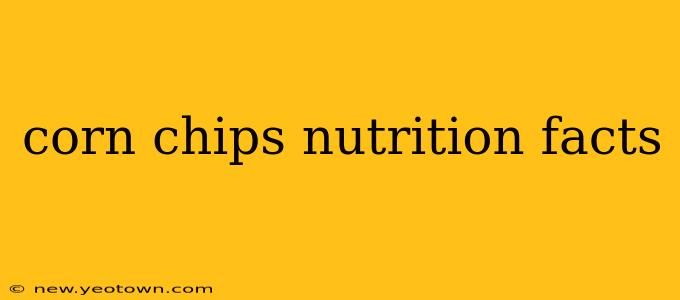Let's be honest, corn chips are a beloved snack. That satisfying crunch, the versatility—dipping them in salsa, using them as a topping, or simply enjoying them straight from the bag—makes them a staple in many pantries. But before you reach for another handful, let's take a closer look at the nutritional facts behind this crunchy treat. This isn't about demonizing corn chips; it's about making informed choices so you can enjoy them guilt-free (or at least, more guilt-free!).
Our journey begins with a typical serving size, usually around one ounce (about 28 grams), which is roughly equivalent to about a handful. However, let's be realistic – a handful often turns into a much larger serving! Keep this in mind as we delve into the details.
What are the Nutritional Values of Corn Chips?
The nutritional composition of corn chips can vary quite a bit depending on the brand, flavor, and whether they're baked or fried. However, a general overview gives us a good baseline. Expect to find a significant amount of carbohydrates, primarily in the form of starch. These provide energy, but it's important to note that this energy is often released quickly, leading to potential blood sugar spikes.
You'll also find a decent amount of fat, again, varying depending on the production method. Fried corn chips naturally contain more fat than their baked counterparts. This fat can contribute to calorie density, so portion control is key. Proteins levels are generally lower in corn chips. Finally, there's a modest amount of fiber, which contributes to digestive health.
Are Corn Chips Healthy?
This is a question with a nuanced answer. In moderation, corn chips aren't inherently "unhealthy." They can offer a quick source of energy and, if you choose baked versions, a somewhat lower fat option. The problem lies in overconsumption and the addition of things like excessive salt, unhealthy fats, and artificial flavors and colors. Remember, a "healthy" diet is about balance and moderation!
What are the Benefits of Corn Chips?
While not a nutritional powerhouse, corn chips can offer some advantages. Some brands now offer whole grain options, slightly increasing the fiber content and promoting better digestive health. Additionally, corn is a source of certain vitamins and minerals, albeit in smaller quantities within the chip itself.
Are Corn Chips High in Sodium?
Yes, corn chips are often very high in sodium. This is a significant concern for many people, as excessive sodium intake can contribute to high blood pressure and other health problems. Always check the nutrition label and opt for lower-sodium options whenever possible.
How Many Calories are in a Serving of Corn Chips?
A typical one-ounce serving of corn chips can contain anywhere from 140 to 160 calories, but remember, this can increase significantly with larger portions. The calorie count is heavily influenced by the type of fat used (more saturated fat increases calories) and the overall serving size.
How Much Fiber is in Corn Chips?
Fiber content varies, with some brands offering slightly higher amounts than others. Look for whole grain corn chip varieties to increase your fiber intake. Fiber is essential for digestive regularity and overall gut health.
What are the Alternatives to Corn Chips?
If you're looking for healthier alternatives, consider baked tortilla chips (often made with whole wheat), veggie chips, or even popcorn—a whole grain snack that provides fiber and antioxidants. These options offer similar satisfying crunch without the same high sodium or high-fat content of some corn chips.
Ultimately, enjoying corn chips in moderation as part of a balanced diet is key. Be mindful of portion sizes, read the nutrition labels carefully, and choose brands that prioritize healthier ingredients whenever possible. Enjoy your crunch responsibly!

